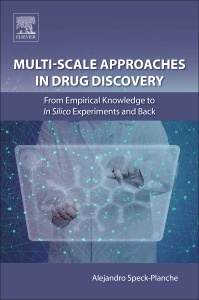Multi-Scale Approaches in Drug Discovery From Empirical Knowledge to In silico Experiments and Back
Coordonnateur : Speck-Planche Alejandro

Drug discovery is an expensive, time-consuming process and the modern drug discovery community is constantly challenged not only with discovering novel bioactive agents to combat resistance from known diseases and fight against new ones, but to do so in a way that is economically effective. Advances in both experimental and theoretical/computational methods envisage that the greatest challenges in drug discovery can be most successfully addressed by using a multi-scale approach, drawing on the specialties of a whole host of different disciplines. Multi-Scale Approaches to Drug Discovery furnishes chemists with the detail they need to identify drug leads with the highest potential before isolating and synthesizing them to produce effective drugs with greater swiftness than classical methods may allow. This significantly speeds up the search for more efficient therapeutic agents.
After an introduction to multi-scale approaches outlining the need for and benefits of their use, the book goes on to explore a range of useful techniques and research areas, and their potential applications to this process. Profiling drug binding by thermodynamics, machine learning for predicting enzyme sub-classes, and multitasking models for computer-aided design and virtual compound screening are discussed, before the book goes on to review Alkaloid Menispermaceae leads, natural chemotherapeutic agents and methods for speeding up the design and virtual screening of therapeutic peptides. Flavonoids as multi-target compounds are then explored, before the book concludes with a review of Quasi-SMILES as a novel tool.
Collecting together reviews and original research contributions written by leading experts in the field, Multi-Scale Approaches to Drug Discovery highlights cutting-edge approaches and practical examples of their implementation for those involved in the drug discovery process at many different levels. Using the combined knowledge of medicinal, computational, pharmaceutical and bio- chemists, it aims to support growth in the multi-scale approach to promote greater success in the development of new drugs.
1. Profiling Drug Binding by Thermodynamics: Key to Understanding 2. Machine Learning Approach to Predict Enzyme Subclasses 3. Multitasking Model for Computer-Aided Design and Virtual Screening of Compounds With High Anti-HIV Activity and Desirable ADMET Properties 4. Alkaloids From the Family Menispermaceae: A New Source of Compounds Selective for ß-Adrenergic Receptors 5. Natural Chemotherapeutic Agents for Cancer 6. Speeding Up the Virtual Design and Screening of Therapeutic Peptides: Simultaneous Prediction of Anticancer Activity and Cytotoxicity 7. Flavonoids From Asteraceae as Multitarget Source of Compounds Against Protozoal Diseases 8. Quasi-SMILES as a Novel Tool for Prediction of Nanomaterials' Endpoints
- Offers practical guidance on ways to implement multiscale approaches for increased efficiency in drug discovery
- Draws on the experience of a highly skilled team of authors under the editorial guidance of one of the field's leading experts
- Includes cutting-edge techniques at the forefront of medicinal chemistry and drug discovery optimization
Date de parution : 03-2017
Ouvrage de 238 p.
15x22.8 cm
Thèmes de Multi-Scale Approaches in Drug Discovery :
Mots-clés :
�1; �2; -Adrenergic receptors; Alkaloids; Anticancer drugs; Artificial neural networks; Asteraceae; Autocorrelation; Cancer; Carcinogens; Chemotherapeutic agents; Complex networks; Contributions; CORAL software; Design; Enzyme subclasses; Flavonoids; Fragments; Graph theory; Hit-to-lead-to-drug optimization; Isothermal titration calorimetry; Machine learning; Mean; Menispermaceae; Monte Carlo method; mtk-chemoinformatics model; mtk-QSBER; Multitarget; Nanomaterial; Nano-QSPR/QSAR; Natural products; Neglected diseases; Pharmacological receptors; Prediction; Protein crystallography; Protein folding; Protein�ligand interaction; Proteomics; Quadratic indices; Quasi-QSPR/QSAR; Quasi-SMILES; Surface water networks; Thermodynamic signature; Virtual screening; Water-mediated protein�ligand binding



